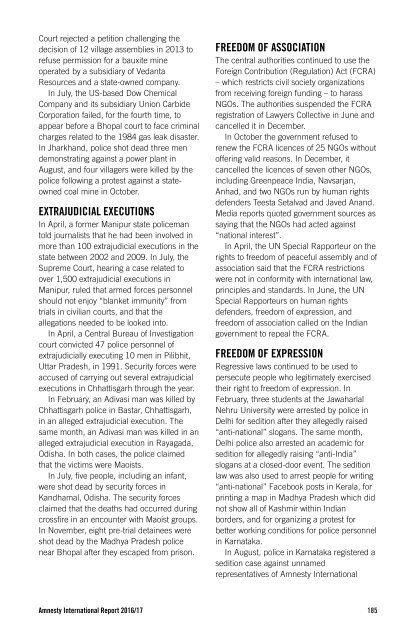AMNESTY INTERNATIONAL REPORT 2016/17
2lEHU9j
2lEHU9j
Create successful ePaper yourself
Turn your PDF publications into a flip-book with our unique Google optimized e-Paper software.
Court rejected a petition challenging the<br />
decision of 12 village assemblies in 2013 to<br />
refuse permission for a bauxite mine<br />
operated by a subsidiary of Vedanta<br />
Resources and a state-owned company.<br />
In July, the US-based Dow Chemical<br />
Company and its subsidiary Union Carbide<br />
Corporation failed, for the fourth time, to<br />
appear before a Bhopal court to face criminal<br />
charges related to the 1984 gas leak disaster.<br />
In Jharkhand, police shot dead three men<br />
demonstrating against a power plant in<br />
August, and four villagers were killed by the<br />
police following a protest against a stateowned<br />
coal mine in October.<br />
EXTRAJUDICIAL EXECUTIONS<br />
In April, a former Manipur state policeman<br />
told journalists that he had been involved in<br />
more than 100 extrajudicial executions in the<br />
state between 2002 and 2009. In July, the<br />
Supreme Court, hearing a case related to<br />
over 1,500 extrajudicial executions in<br />
Manipur, ruled that armed forces personnel<br />
should not enjoy “blanket immunity” from<br />
trials in civilian courts, and that the<br />
allegations needed to be looked into.<br />
In April, a Central Bureau of Investigation<br />
court convicted 47 police personnel of<br />
extrajudicially executing 10 men in Pilibhit,<br />
Uttar Pradesh, in 1991. Security forces were<br />
accused of carrying out several extrajudicial<br />
executions in Chhattisgarh through the year.<br />
In February, an Adivasi man was killed by<br />
Chhattisgarh police in Bastar, Chhattisgarh,<br />
in an alleged extrajudicial execution. The<br />
same month, an Adivasi man was killed in an<br />
alleged extrajudicial execution in Rayagada,<br />
Odisha. In both cases, the police claimed<br />
that the victims were Maoists.<br />
In July, five people, including an infant,<br />
were shot dead by security forces in<br />
Kandhamal, Odisha. The security forces<br />
claimed that the deaths had occurred during<br />
crossfire in an encounter with Maoist groups.<br />
In November, eight pre-trial detainees were<br />
shot dead by the Madhya Pradesh police<br />
near Bhopal after they escaped from prison.<br />
FREEDOM OF ASSOCIATION<br />
The central authorities continued to use the<br />
Foreign Contribution (Regulation) Act (FCRA)<br />
– which restricts civil society organizations<br />
from receiving foreign funding – to harass<br />
NGOs. The authorities suspended the FCRA<br />
registration of Lawyers Collective in June and<br />
cancelled it in December.<br />
In October the government refused to<br />
renew the FCRA licences of 25 NGOs without<br />
offering valid reasons. In December, it<br />
cancelled the licences of seven other NGOs,<br />
including Greenpeace India, Navsarjan,<br />
Anhad, and two NGOs run by human rights<br />
defenders Teesta Setalvad and Javed Anand.<br />
Media reports quoted government sources as<br />
saying that the NGOs had acted against<br />
“national interest”.<br />
In April, the UN Special Rapporteur on the<br />
rights to freedom of peaceful assembly and of<br />
association said that the FCRA restrictions<br />
were not in conformity with international law,<br />
principles and standards. In June, the UN<br />
Special Rapporteurs on human rights<br />
defenders, freedom of expression, and<br />
freedom of association called on the Indian<br />
government to repeal the FCRA.<br />
FREEDOM OF EXPRESSION<br />
Regressive laws continued to be used to<br />
persecute people who legitimately exercised<br />
their right to freedom of expression. In<br />
February, three students at the Jawaharlal<br />
Nehru University were arrested by police in<br />
Delhi for sedition after they allegedly raised<br />
“anti-national” slogans. The same month,<br />
Delhi police also arrested an academic for<br />
sedition for allegedly raising “anti-India”<br />
slogans at a closed-door event. The sedition<br />
law was also used to arrest people for writing<br />
“anti-national” Facebook posts in Kerala, for<br />
printing a map in Madhya Pradesh which did<br />
not show all of Kashmir within Indian<br />
borders, and for organizing a protest for<br />
better working conditions for police personnel<br />
in Karnataka.<br />
In August, police in Karnataka registered a<br />
sedition case against unnamed<br />
representatives of Amnesty International<br />
Amnesty International Report <strong>2016</strong>/<strong>17</strong> 185


